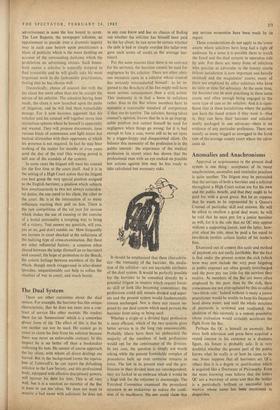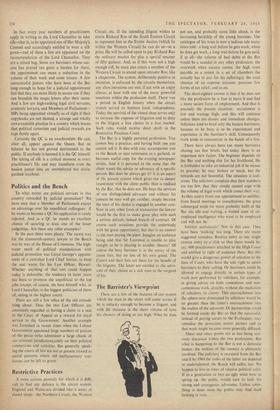Anomalies and Anachronisms
Approval or acquiescence in the present dual system is one thing: acceptance' of its many anachronisms, anomalies and restrictive practices is quite another. The litigant may be persuaded that the services of both a barrister and a solicitor throughout a High Court action are for his own and the public benefit, and that they ought to be paid for with a good grace. But let us suppose that he wants to be represented by a Queen's Counsel of particular skill and renown. He will be asked to swallow a good deal more; he will be told that he must pay for a junior barrister as well, for it is the rule that no QC may appear without a supporting junior, and the latter, how- ever silent his role, must be paid a fee equal to two-thirds (within certain limits) of his leader's fees.
Examined out of context this scale and method of payment are not easily justifiable. But the fact is that under the present system the rich (which term may now include the very poor litigating at public expense) are often grossly overcharged and the poor pay too little for the services they receive. As members of the Bar are more often employed by the poor than by the rich, their consciences are not over-agitated by this so-called 'two-thirds rule.' Indeed without it many a junior practitioner would be unable to keep his financial head above water; and until the whole structure of payments is reviewed and readjusted, the abolition of this anomaly is a remote possibility whose realisation would certainly accelerate the flight from the Bar.
Perhaps the QC is himself an anomaly. But since both television and press have acquired a vested interest in his existence as a dramatic figure, his future is probably safe. It is very doubtful whether the greater part of the public knows what he really is of how he came to be one. Some suppose that all barristers arc QCs, others that it is a degree or qualification which is acquired like a Doctorate of Philosophy. Even the more knowing ones believe that the letters QC are a warranty of some sort that the holder is a particularly brilliant or successful legal warrior whose name has been mentioned in despatches. In fact every year numbers of practitioners apply in writing to the Lord Chancellor to take silk—that is, to be appointed one of Her Majesty's Counsel and accordingly entitled to wear a silk gown—and of these a few are appointed on the recommendation of the Lord Chancellor. They are a mixed bag. Some are barristers whose suc- cess has proved too great a burden for them; the appointment can mean a reduction in the volume of their work and some leisure. A few unsuccessful juniors who have been at the Bar long enough to hope for a judicial appointment feel that they are more likely to secure one if they can brandish the magic letters after their name. " And a few are high-ranking legal civil servants, academic lawyers, and Members of Parliament— MPs being appointed virtually as of right if their copybooks are not blotted, a strange and wholly unwarrantable practice in a country which boasts that political careerism and judicial rewards are kept firmly apart.
Certainly the QC is an anachronism. He can, after all, appear against the Queen. But on balance he has not proved detrimental to the public. If anybody is harmed it is the QC himself. The taking of silk is a critical moment in every practitioner's life and may transform even the busiest junior into an unemployed but distin- guished layabout.







































 Previous page
Previous page